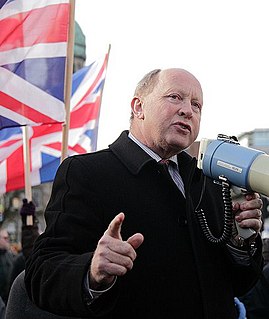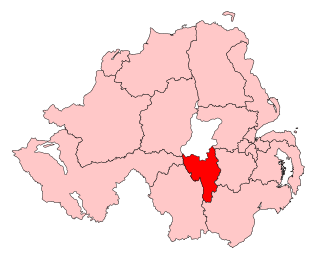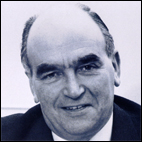
The Ulster Unionist Party is a unionist political party in Northern Ireland. Having gathered support in Ulster, the northern province in Ireland, during the late-nineteenth and early-twentieth centuries, the party governed Northern Ireland between 1921 and 1972. It was supported by most unionist voters throughout the conflict known as the Troubles, during which time it was often referred to as the Official Unionist Party (OUP). Between 1905 and 1972, its peers and MPs took the Conservative whip at Westminster, in effect functioning as the Northern Irish branch of the Conservative and Unionist Party. This arrangement came to an end in 1972 over disagreements over the Sunningdale Agreement. The two parties have remained institutionally separate ever since, with the exception of the 2009-2012 Ulster Conservatives and Unionists electoral alliance.

The UK Unionist Party (UKUP) was a small unionist political party in Northern Ireland from 1995 to 2008 that opposed the Good Friday Agreement. It was nominally formed by Robert McCartney, formerly of the Ulster Unionist Party, to contest the 1995 North Down by-election and then further constituted to contest the 1996 elections for the Northern Ireland Forum. McCartney had previously contested the 1987 general election as an independent using the label Real Unionist.
Robert Law McCartney, QC is a Northern Irish barrister and a former leader of the UK Unionist Party.

Sylvia Eileen, Lady Hermon is a retired Unionist politician from Northern Ireland. She served as the Member of Parliament (MP) for the constituency of North Down from 2001 to 2019.
Sir James Alexander Kilfedder was a Northern Ireland unionist politician.
The Ulster Popular Unionist Party (UPUP) was a unionist political party in Northern Ireland. It was founded in 1980 by James Kilfedder, independent Unionist Member of Parliament for North Down, who led the party until his death in 1995. For a brief period in 1980 it was known as the Ulster Progressive Unionist Party before adopting the "Popular" name.

James Hugh Allister,, is a British unionist politician and barrister from Northern Ireland. He is the leader of the Traditional Unionist Voice (TUV) political party, since 2011 serving as the party's MLA in the Northern Ireland Assembly, representing North Antrim.

Belfast South is a parliamentary constituency in the United Kingdom House of Commons. The current MP is Claire Hanna of the SDLP.

Upper Bann is a parliamentary constituency in the United Kingdom House of Commons. The current MP is Carla Lockhart of the DUP.

North Down is a parliamentary constituency in the United Kingdom House of Commons. The current MP is Stephen Farry of the Alliance Party. Farry was elected to the position in the 2019 General Election, replacing the incumbent Sylvia Hermon, who had held the position since being elected to it in the 2001 general election, but chose not to contest in the 2019 election.

Henry William West was a politician in Northern Ireland who served as leader of the Ulster Unionist Party from 1974 until 1979.

The Belfast South by-election was held on 4 March 1982 following the death of Robert Bradford, Ulster Unionist Party (UUP) Member of Parliament for Belfast South.
The Northern Ireland Conservatives is a section of the United Kingdom's Conservative Party that operates in Northern Ireland. The party won 0.4% of the vote in the 2016 Northern Ireland Assembly election, and 0.3% of the vote in the 2017 Northern Ireland Assembly election.

The Traditional Unionist Voice is a unionist political party in Northern Ireland. The party was founded on 7 December 2007, from a split in the Democratic Unionist Party (DUP). Its first and current leader is Jim Allister who, until 2009, sat as an independent Member of the European Parliament, having been elected for the DUP in 2004. In the 2009 European elections Allister lost his seat when he stood as a TUV candidate. In June 2008, it was announced that former Ulster Unionist Party (UUP) MP William Ross had been made party president.
The Down by-election was held on 6 June 1946, following the death of James Little, the independent Unionist Member of Parliament for Down.
The Ulster Conservatives and Unionists was an electoral alliance in Northern Ireland between the Ulster Unionist Party (UUP) and the Conservative Party.
This is a summary of the electoral history of Margaret Thatcher, who served as Prime Minister of the United Kingdom from 1979 to 1990 and Leader of the Conservative Party from 1975 to 1990. She was the Member of Parliament (MP) for Finchley from 1959 to 1992.

The 2010 United Kingdom general election in Northern Ireland occurred on 6 May 2010 and all 18 seats in Northern Ireland were contested. 1,169,184 people were eligible to vote, up 29,191 from the 2005 general election. 57.99% of eligible voters turned out, down 5.5 percentage points from the last general election.

A by-election for the UK House of Commons constituency of Mid Ulster in Northern Ireland was held on 7 March 2013. The election was triggered by the resignation of Martin McGuinness, who had been elected to the seat in 1997 as the Sinn Féin candidate. The election was won by Francie Molloy, also of Sinn Féin.

The 2015 United Kingdom general election in Northern Ireland was held on 7 May 2015 and all 18 seats were contested. 1,236,765 people were eligible to vote, up 67,581 from the 2010 general election. 58.45% of eligible voters turned out, an increase of half a percentage point from the last general election.This election saw the return of Ulster Unionists to the House of Commons, after they targeted 4 seats but secured 2.











